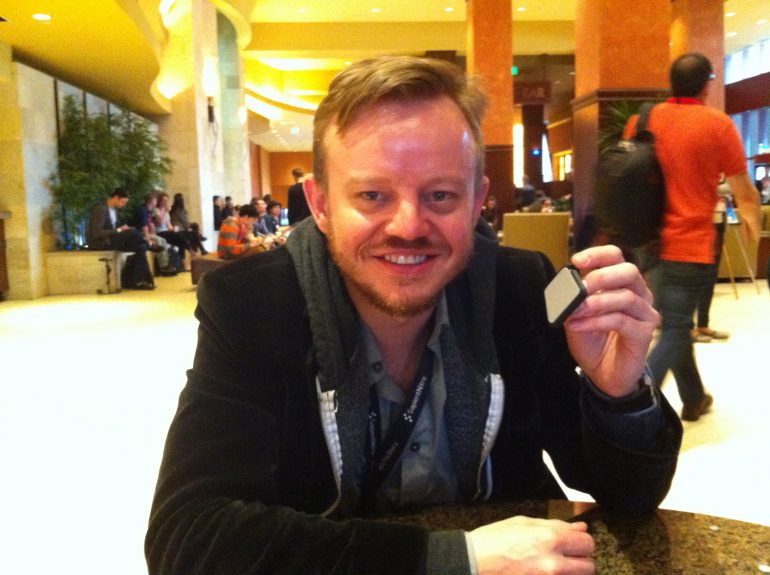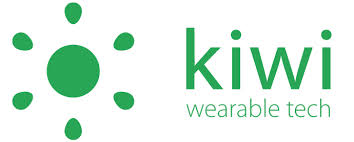Every time I tried to watch the wearable technology portion of the SXSW Interactive Accelerator Pitch Contest, the room was completely packed. Those waiting for a spot to get in formed a line that snaked around corners around the fourth floor of the Hilton Austin Downtown.
One of those companies pitching was Kiwi Wearables from Toronto, a new company that produces sensor-equipped and motion-detecting technology that measures various human metrics. It’s all connected to the Internet, so the data online can reveal things like where a person is, what they’re doing in that environment and what that environment feels like. The company’s flagship product, the Kiwi Move, can be used as a “controller for the Internet” via motion-sensor. “We seek to provide people with the tools and information to unlock the potential of their bodies so they can live healthier and more productive lives,” is the tagline.
I sat down with the company’s founder, Ashley Beattie, and somewhere along the way our conversation shifted to the implications of talks given throughout the week by Wikileak’s Julian Assange and former CIA employee Edward Snowden.
The pair of whistleblowers were undoubtedly the biggesr speakers at the conference, dominating headlines and conversations. Assange methodically and eloquently warned a crowd via Google Hangout that we all continue to be surveilled by governments in a “military occupation of our civilian space”. Meanwhile Snowden, the former contractor for the NSA, said he’d do it all again, “regardless of what happens to me”.
Kind of ironic was that I was sitting across from a guy in Beattie who served with the Royal Canadian Navy for 12 years and also worked for Canada’s national defense system. It made for an interesting chat, and Beattie was clear that as a proprietor of an technology company that produces people’s data, it’s “incumbent upon” him that he protects it. “I need to stand by that and make sure that people are secure in that, and that this isn’t some nefarious scheme to get people’s motion data. If you’re going to build a wearable tech company, people will see through it.”
He expressed frustration at certain wearable tech companies that charge users to get their data back (“that’s my data!”), and emphasized that Kiwi doesn’t want to perform science experiments on its users. The user gets to decide where it goes and where it gets stored.
He called data and privacy a “philosophical thing at the very root of it.” Wearable data is so personal it should be the user’s choice, no matter what, and he hopes that all the other wearable technology companies realize this. “I’m of the opinion that we want to protect that layer of intimacy that a person has. You may not want to share the fact that you smoked a cigarette or laid in bed all day. It’s okay to be that person, that’s you. Its totally okay, but I don’t want to be the person that is reviled for sharing someone’s personal information without them wanting to do that.”
On his background in national defense, Beattie said that people within the institution are “getting a getting a bad rap because of a very select group of people that do things that normal people don’t want to do.” But, he explained, he’s a humanist at heart and “there’s nothing that can change my ideology. I don’t bring any oversight or a surveillance view in this business. My view is that we really want people to live happier and healthier.”
We both commended the SXSW Interactive festival for bringing on Assange and Snowden as speakers and showing that they care about issues like public surveillance and privacy. Beattie said the conference recognized that “the public needs to know more than they know right now.”
It all pointed to some very interesting comments, particularly by Assange. In his webcast he said that we live in a “fog”, and before Snowden and Iraq it was a “fictitious representation of what we thought the world was”. He said we can’t even see the ground, but every so often a clearing in the fog happens, like with the Snowden revelations, “and we see”.
He also pointed out that Snowden has released less than one percent of all the information he’s compiled.
Meanwhile Snowden implied that there’s certain information that wouldn’t be right to share, a point Beattie expanded on. It’s a subject that could be endlessly debated: should we as the public know everything possible that people like Snowden know? Are we prepared to handle that information, or would some of it actually lead to horrible things, like a world war?
“He recognizes that sharing it might not making the world a better place, that the behaviour change that he’d encourage is not necessarily positive for everyone. It’s intelligent. He raised the issue that there’s stuff out there that no one needs to know: who knows what that is? Only he does, but he’s bringing it up to encourage government to be more ethical, to understand the threat and risk of people being disenchanted.”



